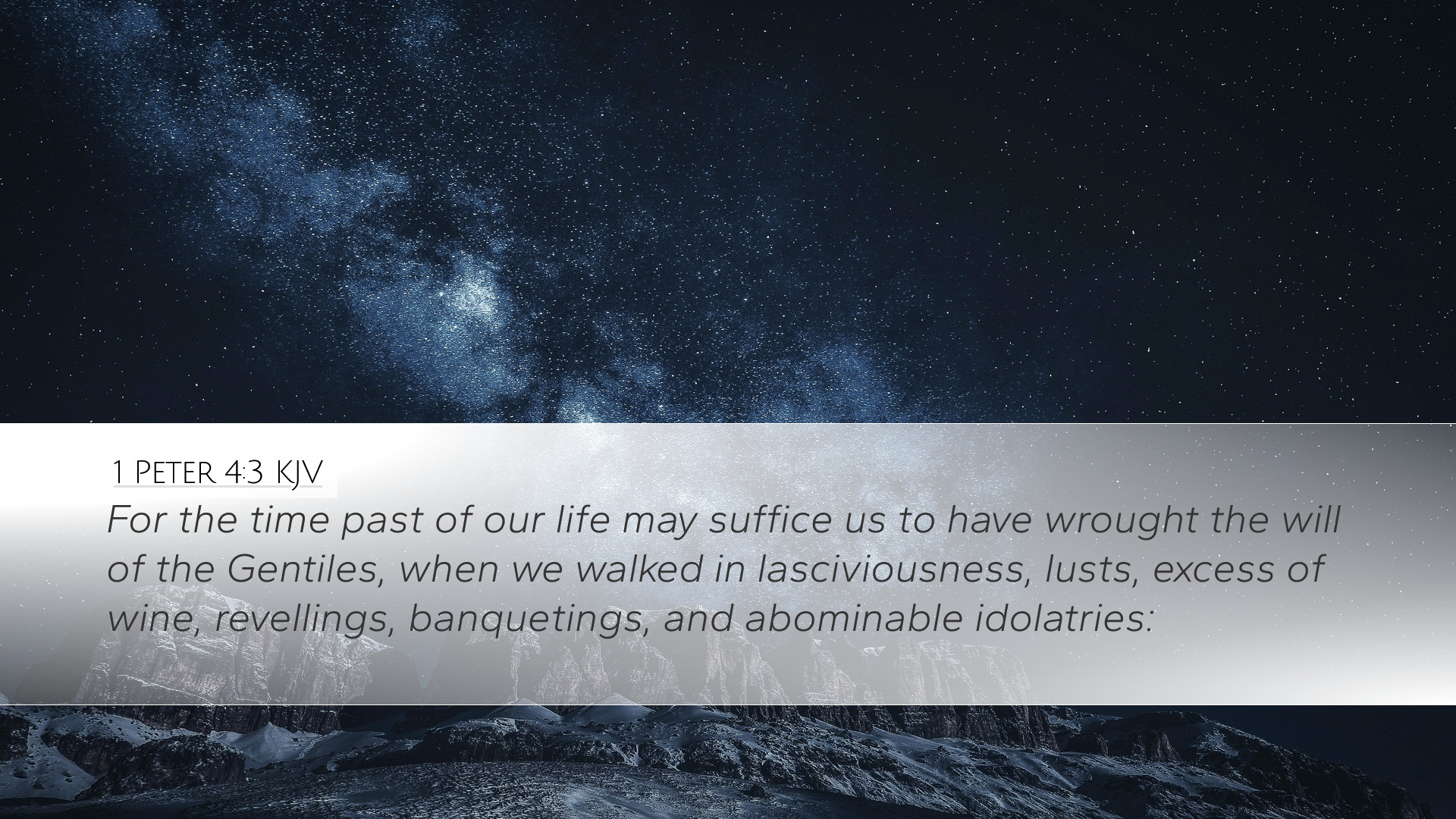Old Testament
Genesis Exodus Leviticus Numbers Deuteronomy Joshua Judges Ruth 1 Samuel 2 Samuel 1 Kings 2 Kings 1 Chronicles 2 Chronicles Ezra Nehemiah Esther Job Psalms Proverbs Ecclesiastes Song of Solomon Isaiah Jeremiah Lamentations Ezekiel Daniel Hosea Joel Amos Obadiah Jonah Micah Nahum Habakkuk Zephaniah Haggai Zechariah Malachi1 Peter 4:3
1 Peter 4:3 KJV
For the time past of our life may suffice us to have wrought the will of the Gentiles, when we walked in lasciviousness, lusts, excess of wine, revellings, banquetings, and abominable idolatries:
1 Peter 4:3 Bible Commentary
Commentary on 1 Peter 4:3
Verse: "For the time that is past suffices for doing what the Gentiles want to do, living in sensuality, passions, drunkenness, orgies, drinking parties, and lawless idolatry."
Introduction
This verse serves as a poignant reminder of the calling to holiness that Christians are to embrace. Peter addresses early believers, highlighting their past behaviors and urging them to remember the transforming power of Christ. This commentary synthesizes insights from respected public domain commentaries to deepen our understanding of this passage.
Contextual Analysis
1 Peter is a letter written to early Christians facing persecution. It encourages them to live righteously amidst suffering. In this context, Peter emphasizes the importance of reflecting on one’s past life, urging believers to abandon sinful behaviors that were once characteristic of their lives before coming to Christ.
Exegesis of Key Phrases
-
"the time that is past suffices"
Matthew Henry emphasizes that the previous time spent in sin should be sufficient justification to leave it behind and pursue a life aligned with God's will. The phrase implies a completion and a definite end to an unholy way of living.
-
"what the Gentiles want to do"
Albert Barnes notes that Peter draws a distinction between believers and Gentiles, symbolizing a life without God. The use of "Gentiles" here represents a lifestyle devoid of divine influence, thus calling Christians to recognize their new identity in Christ.
-
"living in sensuality, passions, drunkenness"
Adams Clarke delineates these terms as representative of an uncontrolled lifestyle fueled by lust and indulgence. These behaviors are not merely actions but reflect a heart turned away from God, indicating a need for repentance and transformation.
-
"orgies, drinking parties, and lawless idolatry"
These terms illustrate the extremes of sinful indulgence; however, the call to abandon them signifies a transition towards a higher calling. Henry notes how such behaviors were prevalent in pagan societies, and it is critical for Christians to distinguish themselves from these practices.
Theological Implications
Peter's admonition carries profound theological weight. It illustrates a stark contrast between a life lived for self and one that is lived for God. This shift is not just behavioral but fundamentally transformational and indicative of one's identity in Christ. Reflections from Barnes suggest that this transformation underscores a believer's commitment to holiness, love, and community.
Practical Application
Pastors and theologians can take this message into contemporary church settings, encouraging congregations to reflect on their past and commit anew to righteousness.
- Self-Reflection: Encourage frequent introspection to recognize past behaviors and the grace that has brought about change.
- Community Accountability: Foster a church environment where individuals can openly share their struggles and find support in their walk towards holiness.
- Emphasis on Identity: Teach that believers are called to live as distinct from the world, walking in newness of life.
Conclusion
1 Peter 4:3 serves as both an admonition and a promise. It challenges believers to discard their past lifestyles and embrace their new identity in Christ, emphasizing the sufficiency of the time spent in sin while also holding out hope for transformation and new life. The insights drawn from the commentaries of Henry, Barnes, and Clarke foster a deeper understanding of the text, encouraging all who read it to pursue holiness and live in accordance with God’s purpose.


